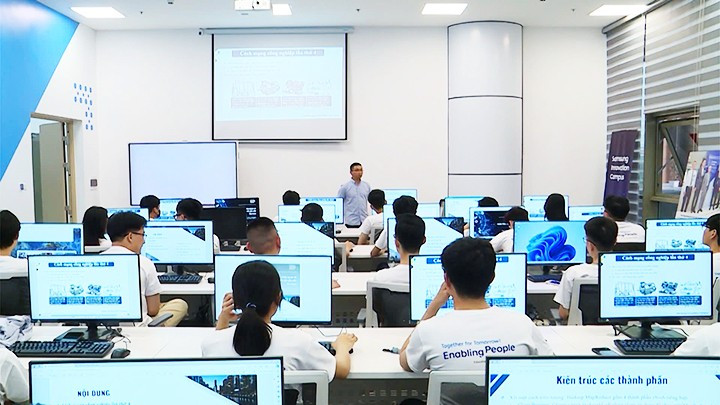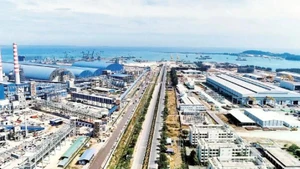Recently, Amkor Group, which was founded by the US-the RoK, has applied for approval to increase the maximum capacity of its 1.6 billion USD semiconductor plant in Bac Ninh Province from 1.2 billion to 3.6 billion items annually. The plant now operates partially with a capacity of 420 million units (147 tonnes per year), and it is expected to expand operations in September 2025 towards reaching stable production by October 2025.
Notably, some equipment has been being directly transported directly from China. This project is expected to be the largest and most advanced manufacturing facility specialising in next-generation semiconductor packaging technology.
Powerful government support
Hana Micron Group (from the RoK) announced a 930 million USD investment at the end of 2024 to expand its chip packaging operations in Vietnam by 2026, in response to client requests to relocate manufacturing away from China.
Explaining the choice of Vietnam, Hana Micron CEO Lee Dong-Chul highlighted the country’s dynamic investment environment, strong government support, good infrastructure, and high-quality human resources at competitive costs.
According to the Ministry of Planning and Investment, by the end of 2024, Vietnam had 174 FDI projects in the semiconductor sector with total registered capital of almost 11.6 billion USD. The semiconductor industrial ecosystem has begun to emerge, encompassing chip design, packaging, and assembly.
These advancements underscore the concerted efforts of agencies at all levels and various sectors in attracting investment and promoting the semiconductor industry in Vietnam, with many legal regulations being reviewed, amended, and supplemented to create a favourable mechanism and policies for semiconductor industry development.
Semiconductors and microchips in particular are considered high-priority technological products for development. The prime minister has approved the Semiconductor Industry Workforce Development Programme until 2030, with a vision to 2050. The programme aims to train at least 50,000 highly skilled professionals at the university level or higher, including 5,000 AI specialists for the semiconductor sector.
Vietnam has approved the Power Development Plan VIII, accelerated the preparation of clean land within industrial zones, and finished infrastructure development (transportation, electricity, water) to enhance connectivity within the semiconductor ecosystem and lower operational costs for businesses. Investment and business procedures for semiconductor projects have been streamlined, with an inter-ministerial task force established to assist investors in swiftly and efficiently implementing their projects in Vietnam.
Expanding successful international cooperation
The International Conference on Artificial Intelligence and Semiconductors 2025 (AISC 2025) is taking place in Hanoi and Da Nang from March 12 to 16. The event gathers more than 1,000 experts, scientists, and leading businesses in AI and semiconductors, including major players such as Google DeepMind, IBM, Intel, TSMC, and Samsung, along with other top tech companies from Silicon Valley and many developed countries and economies worldwide.
At a press briefing, Dr Christopher Nguyen, Founder of Aitomatic from the US, stated that this is a significant international forum showcasing the synergy between AI and semiconductors. It also provides access to the latest insights while reinforcing Vietnam's role in the global semiconductor and AI value chain. He emphasised that Vietnam is becoming a prime destination, attracting global attention thanks to its political stability, strategic position in the global supply chains, and a youthful population of 100 million. These factors present Vietnam with an unprecedented opportunity for technological innovation and development.
Vu Quoc Huy, Director of the National Innovation Centre (NIC), said that Vietnam is one of the fastest-growing digital economies in Southeast Asia, with a strategic geopolitical position, an abundant and tech-savvy young workforce, and increasingly modern infrastructure investment, making it an attractive destination for many major technology corporations, especially in the semiconductor and AI fields.
To leverage the "golden opportunity", Vietnam has been making great efforts to accelerate the development of its domestic AI and semiconductor sectors. A prime example is the successful collaboration with NVIDIA, which has established an AI research and development centre in Vietnam. The NIC is fostering international cooperation in technology development and application to form an innovative ecosystem. Vu Quoc Huy Huy said: "We hope that all key players in the ecosystem will continue to accompany us, creating breakthroughs in innovating growth models for the country's rapid and sustainable development goals."
Moving forward, Vietnam will continue to implement many important and decisive solutions to strengthen investment attraction in this field. As part of these efforts, the government has just issued Decree No.182 on investment support funds. Under the decree, businesses with R&D projects in semiconductors and AI will receive support for up to 50% of initial investment costs.
The NIC has been partnering with many leading global players such as Cadence, Siemens, Intel, Arizona State University (the US), and National Yang Ming Chiao Tung University from Taiwan (China). The centre is working with more than 30 major universities and research institutes worldwide to implement human resource training programmes. It has established R&D centres and representative offices in collaboration with institutions from the US, the RoK, Japan, Taiwan (China).
With high-quality and competitive human resources, state-of-the-art infrastructure, transparent policies, firm political commitment from national leaders, and direct guidance from the prime minister, Vietnam is well-positioned to become a key player in the semiconductor industry.
















